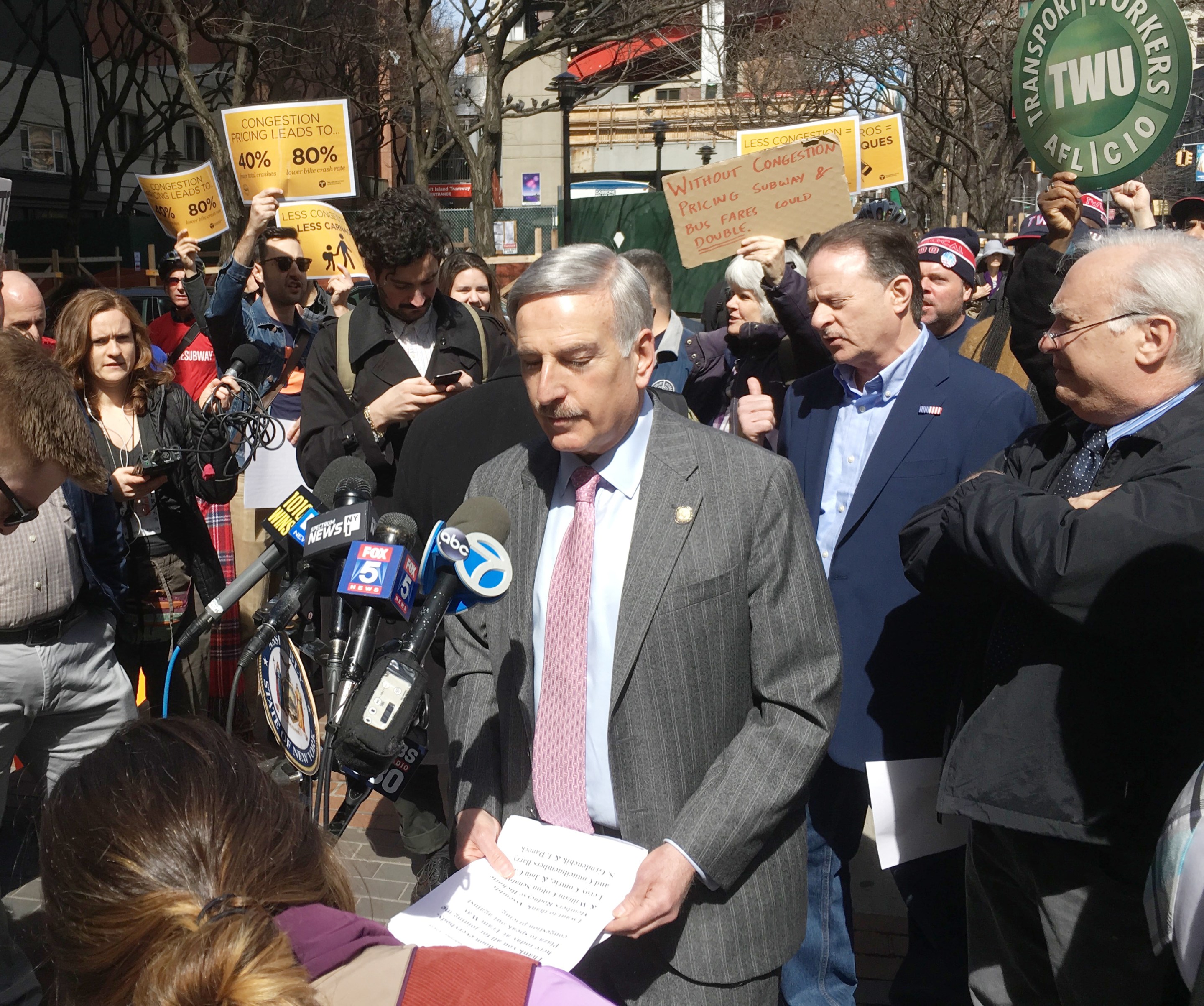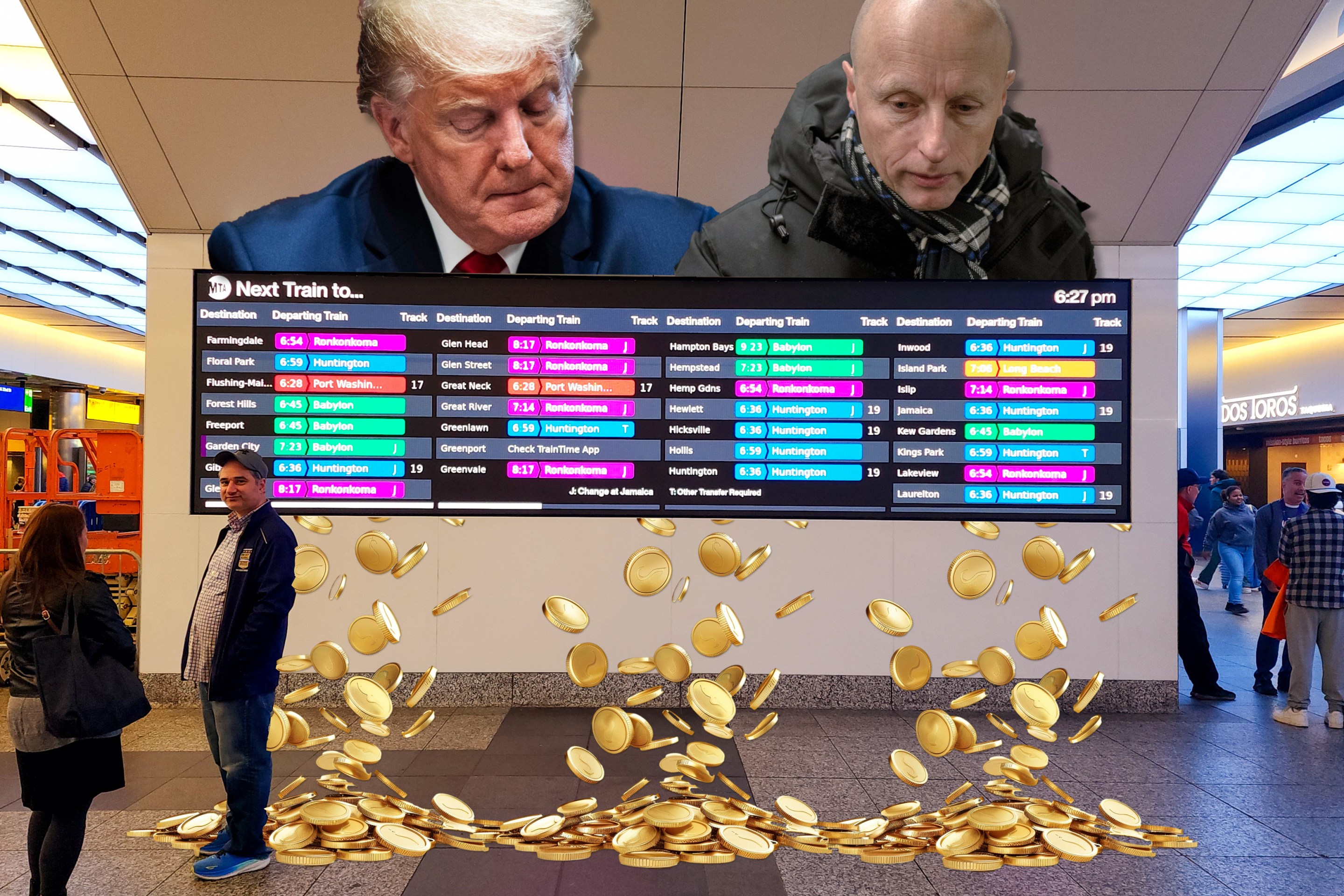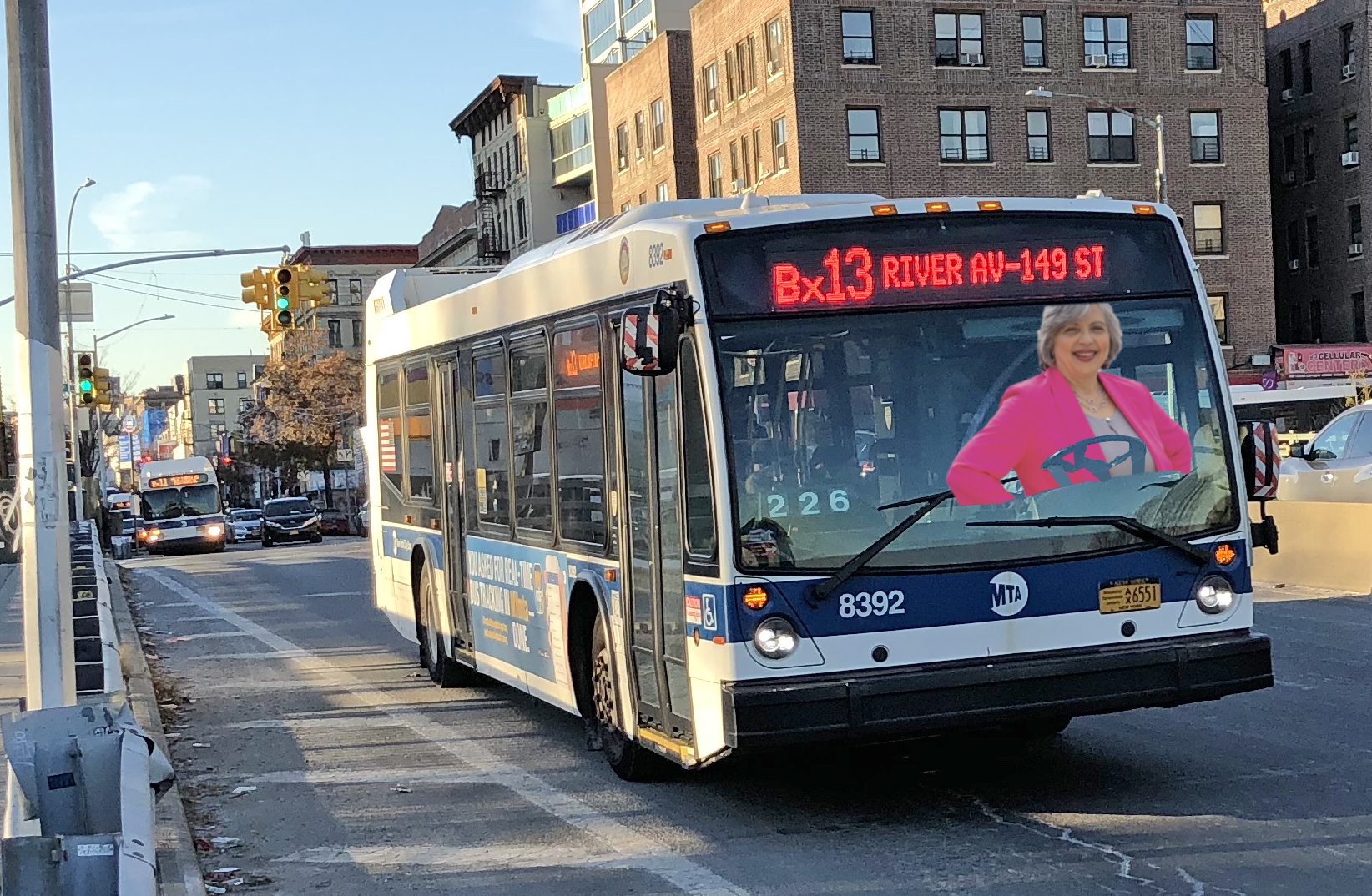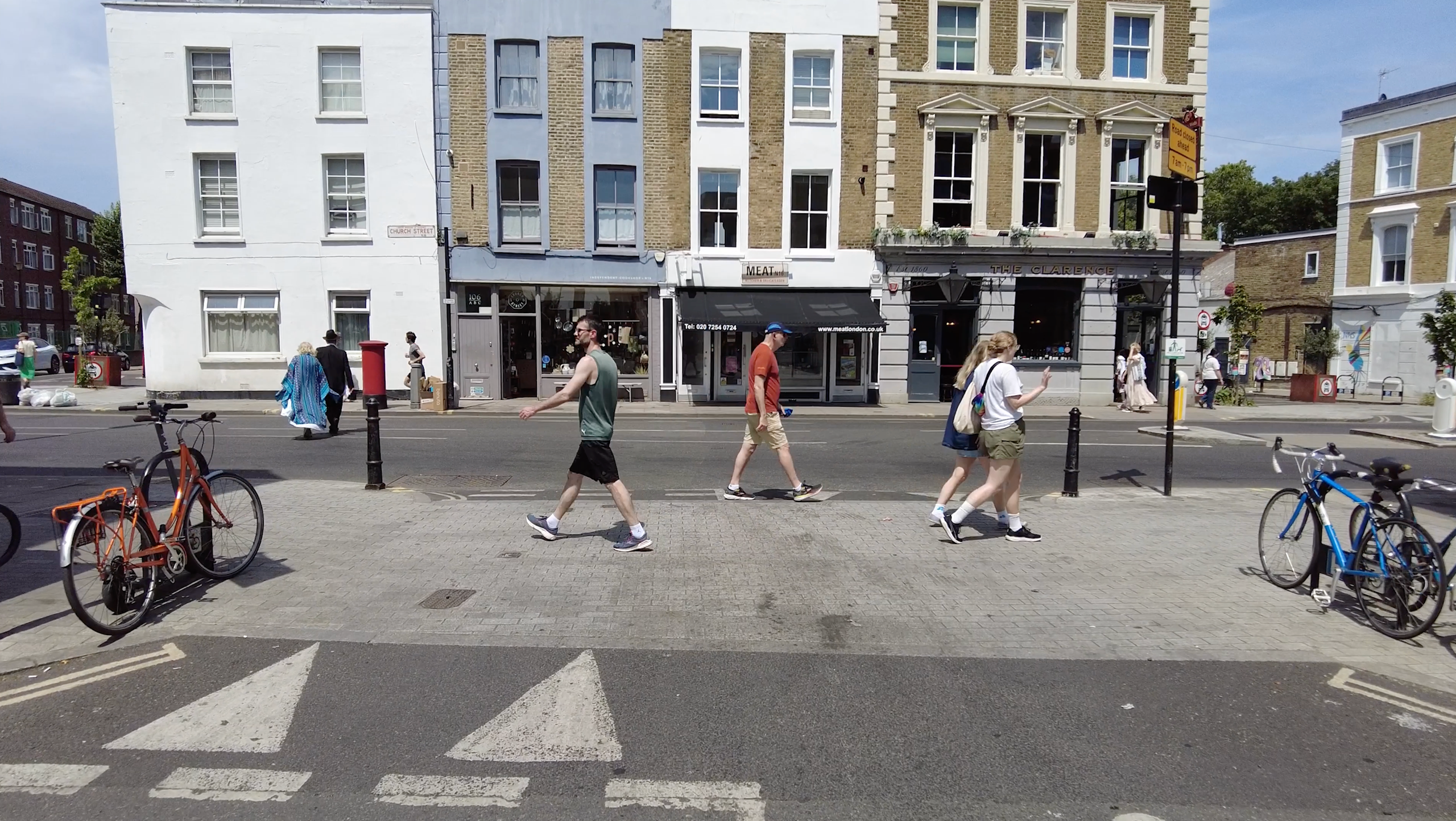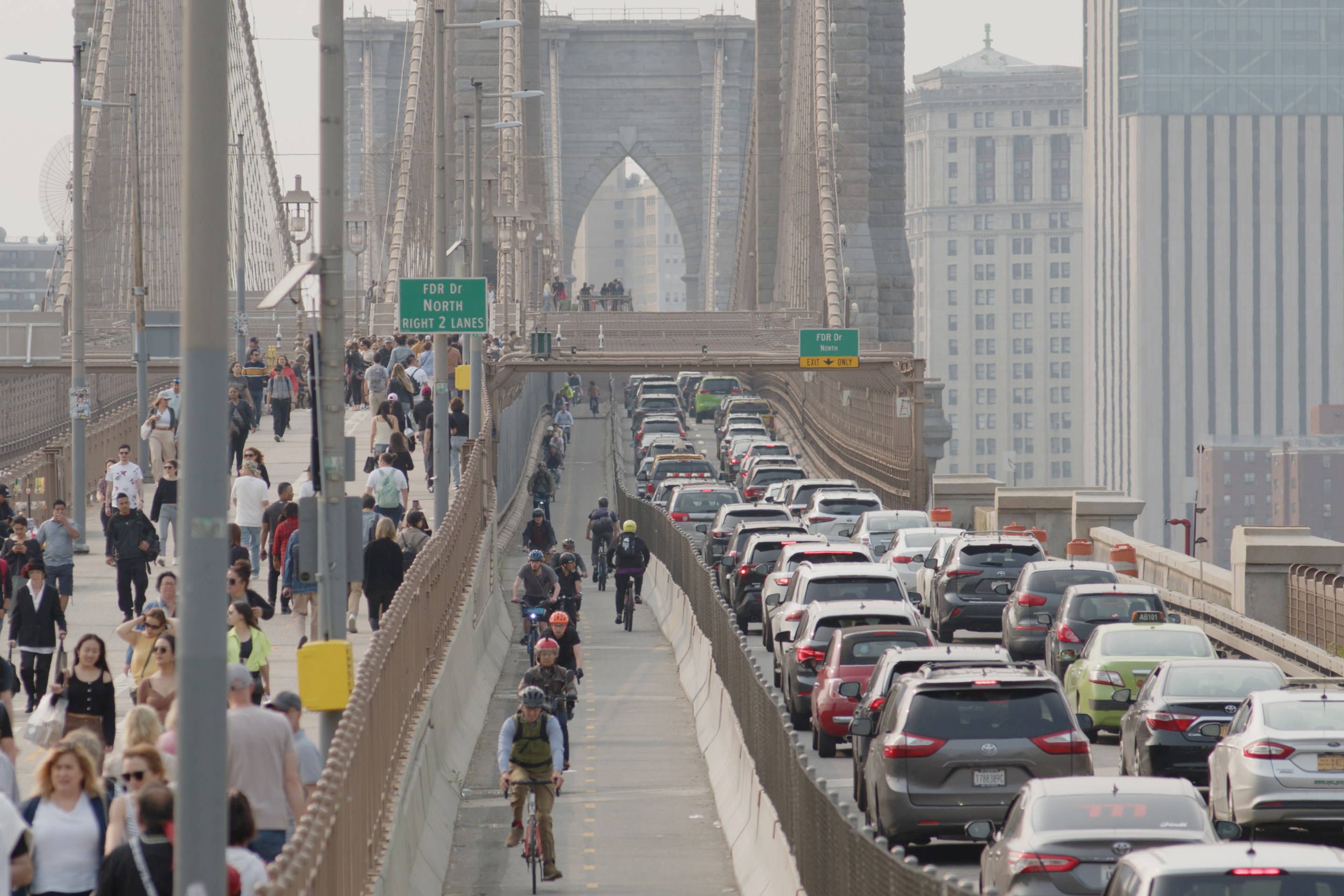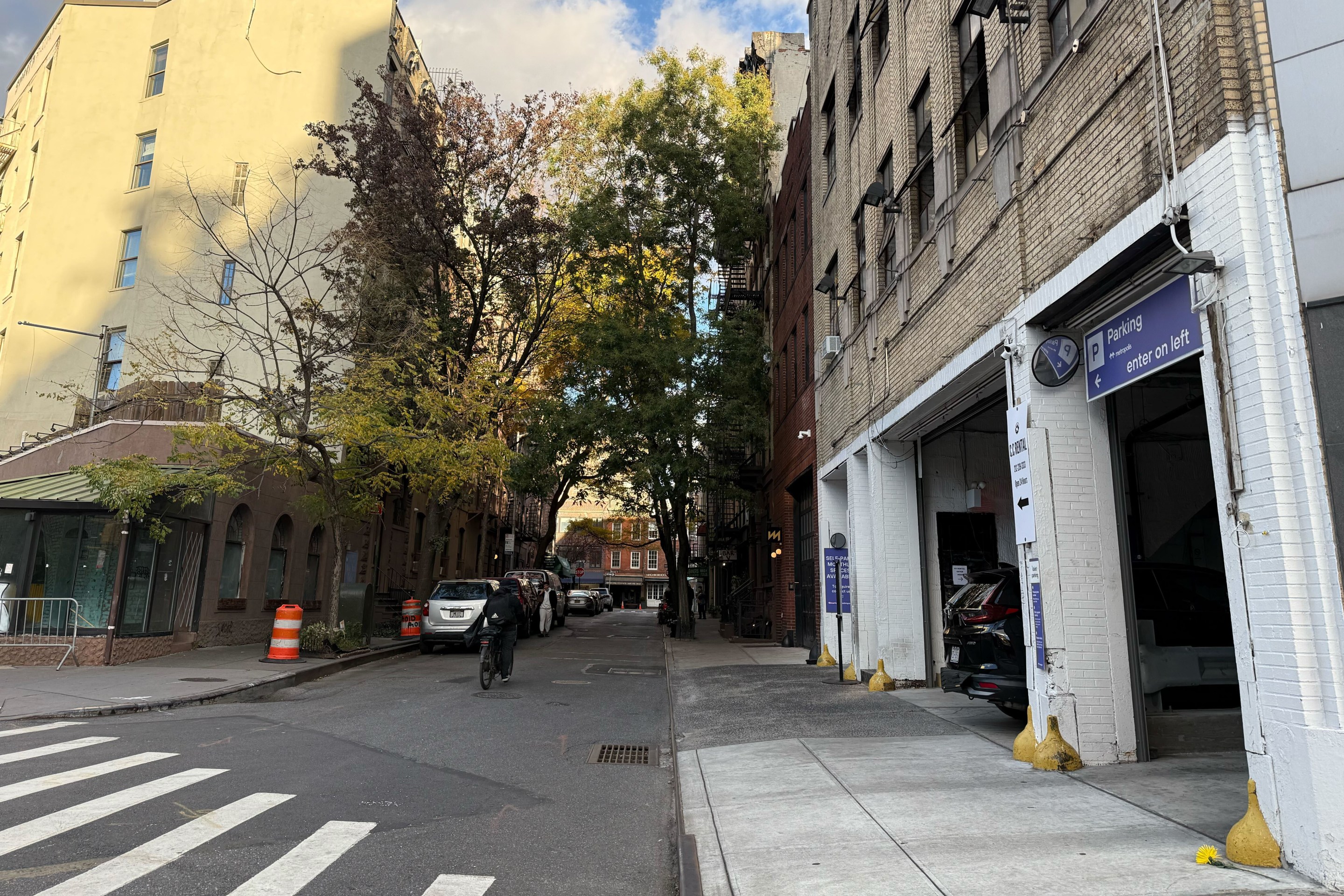About a half-dozen drivers who oppose congestion pricing — including two state legislators — revealed at a wild Midtown press conference on Sunday that they have no plan for raising enough money to save the subway system, as scores of supporters of the transit-rescue plan screamed, "Working people take the subway!" and "Vote them out!"
Assembly Members David Weprin of Queens and Rodneyse Bichotte of Brooklyn were the lone Albany pols who showed up to oppose Gov. Cuomo's plan to charge drivers to enter Manhattan below 61st Street and use the money for $40 billion in overdue transit repairs. The plan is facing a vote in Albany by April 1.
Weprin and Bichotte called congestion pricing an attack on the poor — facts show that it is anything but that — but declined to offer alternatives that could generate enough revenue to fix the subway without the $15 billion in bonds that can be floated from congestion pricing. (Charles Komanoff has prepared many fact sheets on this topic. Here's one.)
"We want to fix our transit also, but we just don't want to fix it with a congestion tax that will disproportionately affect drivers," said Weprin, as protesters kept interrupting him with shouts of "Transit traitor!" and "10 years of inaction ends now!"
Weprin struggled through his opening remarks as protesters screamed at him. He did say he supports many other revenue streams — including a tax on recreational marijuana and a new internet sales tax — to fund New York City Transit President Andy Byford's $40-billion "Fast Forward" plan. One problem: The governor has already set aside those taxes for transit. He also called for a restoration of the commuter tax, a reliable funding stream that was nonetheless killed in 1999 amid a revolt by suburban legislators, whose unlikely support would be needed to restore it.
"The entire MTA problem should not be on the backs of drivers in Manhattan," Weprin said.
He then turned it over to Bichotte, who said some stuff that simply needs to be published in full. It echoed comments she made last week that were equally fact-free:
Let's talk about what congestion pricing really is. Congestion pricing was a phenomenon to address the environmental issues. Not to tax the working class. As many of you know, we have been having a moving disparity across New York City, which has caused the congestion in terms of alternate ways of getting from one end of New York City to the other end of New York City. But let me tell you, unfortunately, a group of wealthy interests got together to put a $10-million study to say, "This is the way we need to increase revenue to fix the subway." It has nothing to do with that. When the mayor and many of our other progressive advocates have proposed a millionaire's tax, they said no. The governor said no. This study came out saying, "We're not going to tax the millionaires. Instead, we're going to tax working-class people."
When she said that, a protester inches from Bichotte yelled, "Working class people take the subway!" Bichotte continued:
You know what? I know how it is. I live in the outer boroughs. I know how it is when it's difficult to move. I know how it is when my community, my subways are molded [Editor's note: She meant "moldy."] We don't have enough transit workers. Meanwhile, fares are always increasing, but transit workers don't get their fair share. The people trying to get to work don't get their fair share. Mold, delays, which is one of the reason why our community had to start and create alternative ways of transportation. As you know, we have dollar vans. We have dollar cabs. And now we have ride-sharing. And let me tell you, because there was disparity in New York City for very long time, where TLC picked and chose who they were going to move — they didn't want to move black people. They didn't want to move Latinos. They didn't want to go to the outer boroughs, which caused [residents] to create new ways of getting around New York City. And now the people who will be affected [by congestion pricing] are people in my community. The immigrant workers. The people who need alternate ways to get into work. Why? Because our subways need fixing. And we've been screaming and shouting about it. No one has done anything about it until now. Gov. Cuomo is using congestion pricing as a ploy. ... It's the wealthiest folks who can get to transit on a black car, who is not even paying for anything out of their own pockets. The corporations are paying. They will not feel it. Our constituents in the outer boroughs, immigrants, families, they are going to feel it. And let me tell you, I'm here for the Manhattaners [sic] also. The people who live in those districts — 14th Street to 96th Street — they, too, are going to get hurt. It's not only rich people who live in Manhattan. We have hard-core working class families who live in Manhattan who should not be subjugated to this punitive tax for no reason. Just because a wealthy group decided to put a study together to say we should be making billions of dollars on the working class. And let me tell you, if we do get the revenue, guess what, it's not going to go to MTA. I want to leave you with this. I was reading the New York Times, and one person said this and I would like to read it: "Throwing more money at the MTA to solve traffic problems is trying to put out a fire with firewater."
After Bichotte spoke, Weprin introduced former Assembly Member Richard Brodsky, a longtime opponent of congestion pricing, who was, at least, concise: "Congestion pricing is a tax on average New Yorkers..."
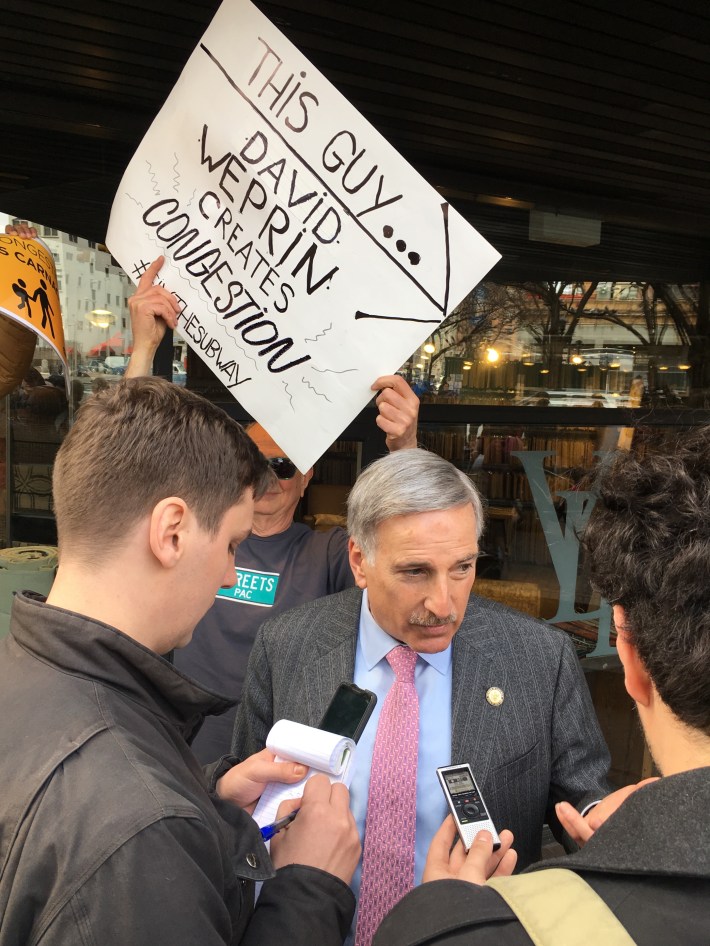
"BULLSHIT!" yelled several protesters at once. Brodsky continued, championing the so-called "pied-a-terre" tax as a way of getting more revenue. The problem? Like the pot tax and the internet sales tax, it's already won the support of Albany legislators and the governor — so it's hardly a new idea.
City Council Barry Grodenchik (D-Queens) also spoke and showed that he carries a MetroCard. (In a Streetsblog piece last year, national congestion pricing expert Charles Komanoff criticized Grodenchik for siding with Brodsky.)
Finally, Weprin took questions. (Fun fact: I was sitting inches from both Weprin and Bichotte, so I got to ask a series of questions while none of the other reporters could be heard over the din — the audio is posted below). I started with a simple question about how Weprin can get to the MTA's $40-billion repair need without congestion pricing:
"Our plan is the pied-a-terre tax, the marijuana tax, the internet sales tax, we can dedicate a revenue stream on taxes that there is broad agreement on," he said. "And there are billions of inefficiency at the MTA." Then he called up other speakers, none of whom was an elected official.
The reporters largely ignored those others. Finally, I asked Bichotte why she considers congestion pricing a tax on the working poor when Census figures, crunched by the Tri-State Transportation Campaign, show that only 1.9 percent of residents of her district commute into the congestion zone versus 92 percent who take transit. And the drivers earn, on average, $10,000 more per year than those who take transit.
"No one knows my community," she said. "We have outsiders speaking for my community. My community is knocking down my door saying they don't want to be taxed."
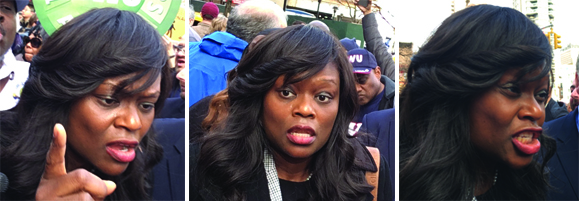
Weprin started mentioning taxes he could support, and Bichotte jumped in with her own list: "Alcohol tax! Tobacco tax! Casino tax!" she added, screaming. "We care about our people in our community, we care about the drivers. We care about the people who have to get to work. The subway is overcrowded."
Again, I reminded Bichotte how few people from her community actually drive into the central business district.
"It doesn't matter! They take Uber. They take Lyft. They take dollar vans," she said. "Basically you want to limit people to have options to go to Manhattan because you've done a study that their behavior shows they don't go into Manhattan? That's a disparity already. And that's wrong. I want them to have the ability to freely go to New York City without being charge."
How many? I asked.
"It's a large percentage!" Bichotte said.
How do you get around your district?
"I drive," she said.
So you see this as a tax on you?
"Yes, it's a tax on me. I would be a tax on everybody. I have to drive everywhere. I even drive upstate," she said.
I reminded her of the Census data.
"You have to understand, the Census is not accurate," she said.
The Census is not accurate? OK, so what are you basing your position on?
"I see the people. I drive in the cars. I see drivers," she said.
True or false, Assemblywoman, the vast majority of your constituents take the subway.
"Yes, but they also take ride-share and dollar vans," she said.
Not into the central business district, I reminded.
And with that, she moved on to other reporters. But here's a final thought: Assembly Member Bichotte has positioned herself as a leader of the fight against congestion pricing. She should get the facts right.
Oh, and by the way, here's her driving record, thanks to Second Avenue Sagas:
Welp. Here’s @AMBichotte’s driving record. https://t.co/0E1KkTZdFv
— Second Ave. Sagas (@2AvSagas) March 24, 2019
[Final note: Genuine transportation nerds should definitely listen to the tape of today's event, which was recorded in two segments by this reporter, crouched in the middle of the fray. (Fun fact: My voice can be heard frequently urging the politicians to stop making speeches and just take reporters' questions, so we could all go home.)]
Segment one: The first part of the press conference.
Segment two: The second part, plus interviews (the full back-and-forth with Bichotte, which is incredible, is from 1:20 to 9:43, when other reporters started asking questions:
